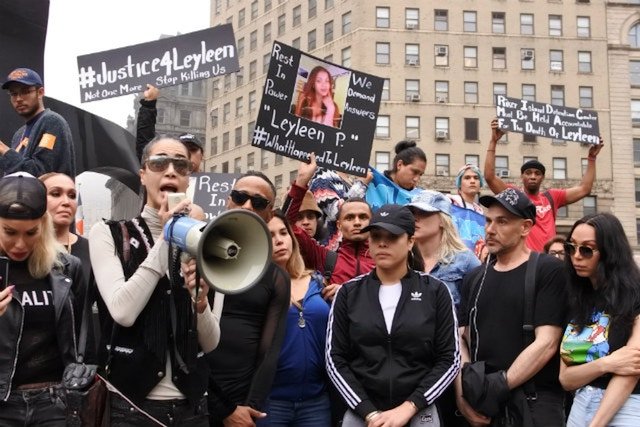Medical Examiner Rules Layleen Polanco Died Of Epileptic Seizure While In Solitary Confinement On Rikers
July 31, 2019, 1:47 p.m.
"Layleen Polanco's passing further underscores the dangers of solitary confinement, which isolates already medically fragile people from observation and care."

Protesters rally in Foley Square after Layleen Polanco's death in early June.
The Chief Medical Examiner has identified a cause of death for Layleen Cubilette-Polanco, the transgender inmate found dead in her Rikers cell last month. According to Dr. Barbara Sampson, Polanco's genetic tests pointed to a mutation associated with epileptic seizures, suggesting she suffered a "sudden" fatal complication from the neurological disorder.
Still, since the 27-year-old's death in early June, Polanco's loved ones, fellow inmates, and advocates have all questioned why she was being held at the jail in the first place—and in solitary confinement, no less. "The SHU [Special Housing Unit, i.e. solitary confinement] is horrible. They put you there and they just leave you there," former inmate Alexie Sotomayor previously told Gothamist, noting that Rikers staff allegedly knew about Polanco's medical condition. "A week before [her death] she had a seizure and it took more than 25 minutes for medical to get there."
At the time, the Department of Corrections denied that Polanco had been confined to SHU, and said she was detained in the Restrictive Housing Unit (RHU) at Rikers' women's facility, meaning she could leave her cell for up to seven hours per day. Not everyone seems convinced, though.
"Layleen Polanco's death is an absolute tragedy, and her passing further underscores the dangers of solitary confinement, which isolates already medically fragile people from observation and care," Tina Luongo, Attorney-In-Charge of the Criminal Defense Practice at The Legal Aid Society, said in a statement, calling on Mayor Bill de Blasio to close Rikers and do away with solitary confinement altogether.
And then, there's the separate-but-related issue of why Polanco was at Rikers in the first place. She was detained in mid-April on misdemeanor assault charges, with her bail set at $500—a sum she couldn't pay. A judge had reportedly ordered her release, but because she'd missed court appearances for drug and prostitution charges from 2017, she reportedly remained behind bars. At the time of her death, a spokesperson for the Manhattan D.A.'s office told Gothamist they were "still looking into" why bail was set in this case at all.
On top of all of that, the NY Post reports that Polanco had bruises on her face when officials found her body, raising concerns about her treatment in lock-up. More broadly, her state also raises concerns about the treatment of transgender and gender-nonconforming inmates at Rikers, who have been subjected to all manner of harassment and abuse from staff and detainees alike.
Today we also received documentary confirmation that Layleen’s epilepsy was well known to DOC, and she suffered multiple seizures on Rikers.
On 5/30, a jail doctor approved her placement in punitive segregation, despite her epilepsy.
That became her death warrant.
(2/3)— Shanies Law Office (@ShaniesLaw) July 30, 2019
David Shanies, an attorney representing Polanco's family, pointed the finger at the DOC for separating her from the general population, even though officials were aware of her medical history: Polanco reportedly had two seizures during her time in the jail.
"Today we also received documented confirmation that Layleen's epilepsy was well known to the DOC, and she suffered multiple seizures on Rikers," Shanies wrote in a tweet.
"On 5/30, a jail doctor approved her placement in punitive segregation, despite her epilepsy," he continued. "That became her death warrant."